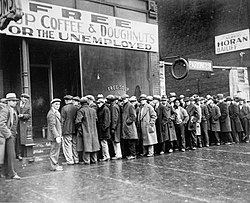
The economy is under durress. Job-loss is inevitable. If you devoted your life to a career you loved, one that made you happy, it is not unheard of to grieve in a layoff situation. The five stages of grief translate easily to the resulting emotional dejection. Those stages begin with denial and isolation, then proceed to anger, bargaining, depression, and acceptance.
I believe that although you pass through these stages, there is a consistent gravitation to feel all of the stages at once, like a spinning record designed to make you insane with doubt, until confidence is shattered. Even when responsibility is accepted, anger will likely linger, especially if the job situation ended unfairly in any way.
The fact that there are fewer and fewer jobs available doesn't exactly make it easy to move forward, and although there is plenty to to accept as a result of the layoff, there is no need to accept the idea that you are no longer a valuable asset.
It seems the list omitted the step happens in place of acceptance, when you decide to take matters into your own hands and make things happen yourself rather than accept the path laid out for you.
This replacement step isn't easy. You have to put aside the notions of who you were and make room for who you will become, beginning with who you are. What are your values? Your intrinsic needs? Your passions?
It took me almost a year suffering the despondency of grief, heightened by taking the worst possible jobs for my personality type. I was sitting at one of these jobs, making less than I've ever earned, when I realized the freedom of financially bottoming out.
I refuse to accept the underlying stipulations of a layoff. My grief ends on my terms. And in so many ways, it paid off.
